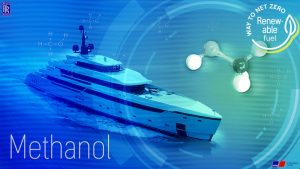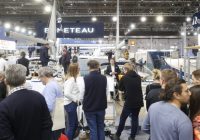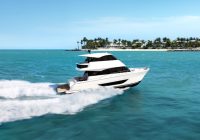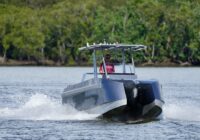Article by METSTRADE
At the 2024 Boat Shows, Rolls-Royce presented new propulsion, bridge, automation and service solutions under the mtu product brand that will be offered to yacht customers from bridge to propeller in the future. The solutions, which also help customers reduce their carbon footprint and emissions, include state-of-the-art combustion engines that are approved and tested for renewable diesel (HVO), exhaust aftertreatment systems, hybrid systems, automation and bridge systems. Rolls-Royce is also currently working on concepts for future methanol engines that can be operated with green methanol in a CO2-neutral manner.

On the way to CO-2-neutral shipping
“The combustion engine will remain at the heart of the Rolls-Royce mtu portfolio for shipping in the coming years. The right combination of solutions is the first step on the way to Net Zero”, explained Denise Kurtulus, Senior Vice President Global Marine at Rolls-Royce. This includes technologies such as exhaust gas aftertreatment, but also sustainable fuels. Rolls-Royce offers mtu exhaust aftertreatment systems for mtu Series 2000 and 4000 diesel engines and, more recently, for the large Series 1163 and 8000 engines. The main diesel engines are already approved for operation with renewable diesel (HVO). Yacht operators can save up to 90 % CO2 emissions, up to 40 % particulate emissions and up to 8 % nitrogen oxide emissions by using HVO instead of fossil diesel. A number of customers, such as Meros Yachtsharing, which offers alternatives to yacht ownership, have been using HVO successfully for several years. With the further expansion of mtu NautIQ automation solutions, Rolls-Royce is investing in better data management in order to optimize the operation of yachts with regard to their emissions.
Why diesel will continue to be in demand
Diesel is the fuel with the highest energy density, so the range is sensational. Diesel is sufficiently available worldwide, the handling is well known and safe. Compared to battery-powered ships, diesel-powered ships can be operated very flexibly as long as there is fuel in the tank. There are currently many advantages of diesel, which is why 99 percent of the existing fleet runs on diesel.
Why is HVO a quick win?
The benefits of HVO are clean combustion with a reduction in particulate emissions of 40 percent or more, nitrogen oxide emissions of up to eight percent, and (depending on the production process and feedstock) CO2 emissions of up to 90 percent (well-to-wake) compared to fossil diesel. Because HVO fuel is made from renewable raw materials, in part from waste, its production, transport and combustion generate only about as many greenhouse gases as were absorbed by the plants during the growth of the biomass. The big advantage of using HVO is, that it can replace conventional diesel fuel, in mtu proven engines without any adjustments.
Why are we expanding our portfolio to include methanol engines in the medium term?
“We need a CO2-neutral fuel alternative to diesel. That is why we have looked at various energy sources. We see e-methanol as the fuel for future shipping, which is now widely regarded as suitable in the maritime industry”, said Denise Kurtulus, Senior Vice President Global Marine at Rolls-Royce.
With “green” methanol from renewable energies, CO2-neutral operation is possible. In addition, harmful emissions such as nitrogen oxides can be reduced enormously. Compared to other “e-fuels” (H2, methane, ammonia), methanol has the highest energy density when the refueling system is taken into account. Rolls-Royce is currently developing methanol propulsion solutions for workboats and yachts.
With hybrid systems emission-free into the harbour
Rolls-Royce also supports customers in the hybridization of their propulsion systems. A hybrid propulsion system that combines combustion engine, batteries and electric drive offers the possibility of completely emission-free local operation in ports. Since the end of June 2024, the Italian shipping company Liberty Lines in Sicily has put the first three of a total of nine fast ferries with mtu hybrid propulsion systems from Rolls-Royce into operation. Rolls-Royce is currently supplying an mtu Hybrid PropulsionPack to the Turkish yacht builder Turquoise Yachts for installation in a new 76-meter megayacht. The yacht will be equipped with an integrated mtu hybrid propulsion system from Rolls-Royce that includes two mtu 12V 4000 M65L engines that meet the strict IMO III emissions standard with the help of an SCR system.
Integrated mtu bridge provides single point of access to all information
Since 2023 Rolls-Royce offers new bridge and automation solutions from specialist Team Italia Marine, which Rolls-Royce acquired. With increasing complexity of on-board systems – with hybrid and electric propulsion systems, exhaust aftertreatment systems, alternative fuels, etc. – the integrated bridge represents a perfect infrastructure, providing a single point of access to all information in a structured and efficient way. The same infrastructure will host autonomous functions, equipment health management (vessel monitoring systems) from the mtu NautIQ portfolio and other data-driven functions in the future.
Rolls-Royce in the maritime industry
Rolls-Royce offers mtu propulsion and automation systems for yachts, commercial vessels (e.g. ferries, offshore supply vessels, tugboats) and government vessels (e.g. coast guard, military). Sales in the commercial marine sector accounted for twelve percent of Rolls-Royce Power Systems’ sales in 2023; the adjusted total sales of Rolls-Royce Power Systems amounted to around EUR 4.6 billion in 2023. Rolls-Royce Power Systems is number one in the yacht market for yachts over 40 meters in length. With its bridge-to-propeller strategy, the company intends to remain strong here and equip yachts with mtu engines as well as hybrid propulsion systems, pod propeller drives, bridges and automation systems. Rolls-Royce has also been successful in the ferry market for decades: around 850 fast ferries worldwide are powered by mtu propulsion systems. No other engine brand is on board so many fast ferries. Rolls-Royce Power Systems is equally well represented in the world’s navies.
About Rolls-Royce Power Systems
Rolls-Royce Power Systems is headquartered in Friedrichshafen in southern Germany and employs more than 10,500 people. The product portfolio includes mtu-brand high-speed engines and propulsion systems for ships, heavy land, rail and defence vehicles and for the oil and gas industry. The portfolio also includes diesel and gas systems and battery containers for mission critical, standby and continuous power, combined generation of heat and power, and microgrids. With its climate friendly technologies, Rolls-Royce Power Systems is helping to drive the energy transition.







